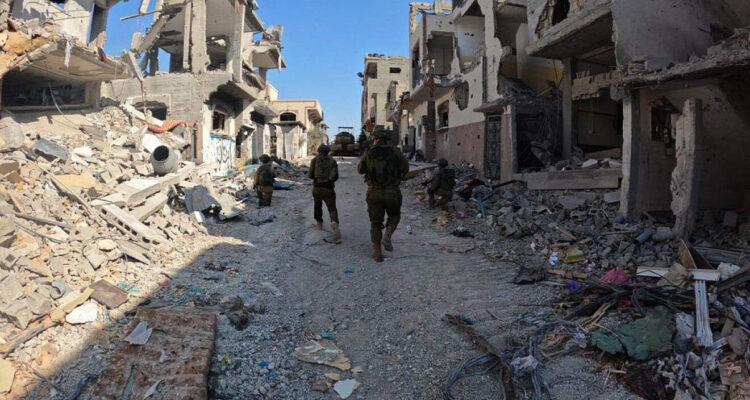‘We are in a difficult, long war,’ says Netanyahu. ‘We have so many achievements, but also painful losses.’
By Charles Bybelezer, JNS
The Israel Defense Forces announced early Wednesday morning the deaths of ten additional soldiers in the Gaza Strip, bringing to 12 the number of troops killed in action after the losses the previous day.
The soldiers were identified as Lt. Ariel Reich, 24; Cpl. Asif Luger, 21; Staff Sgt. Halel Solomon, 20; Staff Sgt. Erez Mishlovsky, 20; Staff Sgt. Adi Leon, 20; Staff Sgt. Roei Dawi, 20; Sgt. Adi Danan, 20; Cpl. Ido Ovadia, 19; Cpl. Lior Siminovich,19; and 2nd-Lt. Pedaya Mark.
Reich and Luger, who served in the 7th Armored Brigade, died when their tank drove over an explosive device. Two other soldiers were seriously wounded by the blast.
The other troops, who served in the Givati Infantry Brigade’s Tzabar Battalion, died when their armored vehicle was struck by a Hamas anti-tank missile. Four additional soldiers were wounded in the incident, one seriously.
“We are in a difficult war. This will be a long war. We have so many important achievements but also painful losses,” said Prime Minister Benjamin Netanyahu on Wednesday.
“We know that every soldier of ours is an entire world. The entire people of Israel embraces you, the families, from the depth of our heart. We are all with you in your heavy sorrow.
“Our soldiers have fallen in the most just of wars, the war for our home. I promise the citizens of Israel: We will complete the job, we will continue until victory,” the premier said.
On Tuesday evening, the military announced the deaths of Staff Sgt. Roei Wolf, 20, and Staff Sgt. Lavi Lipshitz, 20, both of whom served in the Givati Infantry Brigade’s reconnaissance unit.
“The fall of IDF fighters in battle against Hamas terrorists in Gaza is a hard and painful blow. Our hearts and thoughts are with their dear families,” said Defense Minister Yoav Gallant on Wednesday.
“The significant achievements of the heavy fighting in the depths of the Gaza Strip unfortunately exact a heavy price. We are prepared and ready for a long and complex campaign that requires courage, determination and perseverance. We will win,” he added.
The IDF continued to pound Hamas assets in Gaza from the land and air overnight Tuesday, striking terrorist cells and command and control centers. One of the latter was located in a multi-story building deliberately located next to a school and medical office, according to the Israeli military.
Since the start of the war on Oct. 7, the IDF has hit some 11,000 Hamas targets in the Gaza Strip.
IDF ground forces continued to make significant gains in northern Gaza on Tuesday, as Israeli Air Force fighter jets carried out a large-scale strike on Hamas’s Jabalia Battalion.
IDF units operating in the Hamas stronghold in northern Gaza killed approximately 50 terrorists. The battalion’s commander, Ibrahim Biari, who was killed in an airstrike, was one of the leaders directly responsible for Hamas’s Oct. 7 massacre, according to the military.
On Tuesday evening, IDF Spokesperson Rear Adm. Hagari singled out Hamas commander in Gaza Yahya Sinwar, stating that he bears responsibility not only for the Oct. 7 massacre but also for the collapse of Gaza.
Meanwhile, The New York Times reported on Tuesday that U.S. commandos are in Israel to help authorities locate the more than 230 hostages being held in Gaza.
Officials who spoke on condition of anonymity told the newspaper that several dozen American special force operators have been sent, in addition to a team that was already in the Jewish state for training.
The U.S. troops have not been assigned any combatant roles in Israel and will only be deployed to evacuate and secure embassies in the region if necessary.
The report added that several Western countries have covertly moved special forces to the region over fears that Iranian-backed Hezbollah in Lebanon could enter the war.





